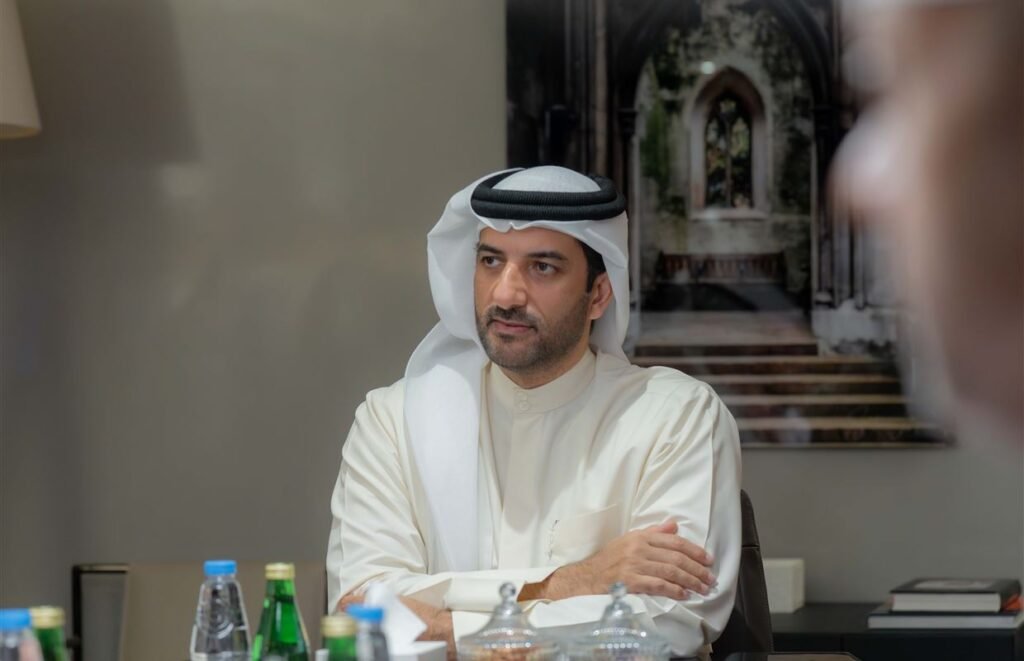His Highness Sheikh Sultan bin Ahmed bin Sultan Al Qasimi, Deputy Ruler of Sharjah and Chairman of the Tamayuz Award, recently chaired a crucial brainstorming session to refine and elevate the prestigious Tamayuz Award. The event, held at City Centre Al Zahia, marked a pivotal moment in Sharjah’s ongoing commitment to institutional excellence, performance improvement, and the cultivation of innovation across government entities. The session brought together senior officials, department heads, and institutional leaders, all united by a shared vision to shape the future trajectory of the award in line with Sharjah’s broader development goals.
Strengthening a Culture of Excellence
The session commenced with a thoughtful and compelling documentary that examined the global landscape of corporate governance and competition. The film provided insights into how major international corporations strive to implement effective governance models and deal with operational challenges in highly competitive markets. It served as a springboard for discussions about how Sharjah’s government departments could integrate global best practices in quality, teamwork, and performance development into their organizational cultures.
In his opening remarks, Sheikh Sultan bin Ahmed stressed that the Tamayuz Award should serve as both a motivator and a benchmark for institutions to strive for excellence. “The goal is not merely to win,” he stated, “but to embed the principles of excellence into the core of every organization. It is about sustainable development, long-term vision, and ensuring our institutions are agile, competitive, and citizen-centric.”

Vision Rooted in Leadership
Sheikh Sultan bin Ahmed took a moment to acknowledge and congratulate the recent promotions of several leaders who were entrusted with greater responsibilities by His Highness Dr. Sheikh Sultan bin Mohammed Al Qasimi, Supreme Council Member and Ruler of Sharjah. His recognition highlighted the leadership’s confidence in the talent pool within Sharjah’s institutional framework and reaffirmed the government’s trust in their capacity to elevate performance standards.
He further emphasized that leadership plays a pivotal role in achieving institutional excellence. A leader, he said, must be proactive in identifying performance gaps, empowering employees, and guiding their teams through transformative journeys. Excellence, in this context, is not limited to results but includes the methods, ethics, and vision employed in achieving those results.

Refining the Award’s Objectives and Criteria
One of the central focuses of the session was the assessment and evolution of the Tamayuz Award’s structure. Participants were encouraged to share their thoughts on the current award criteria, highlight challenges they face in implementation, and propose innovative adjustments that could make the award more inclusive, dynamic, and impactful.
Currently, the Tamayuz Award revolves around several key pillars: improving institutional performance, enhancing service delivery, ensuring customer satisfaction, optimizing resource use, and developing human capital. During the brainstorming session, Sheikh Sultan bin Ahmed proposed that these pillars be reinforced with mechanisms to measure impact over time, promoting a more data-driven and outcome-oriented evaluation model.
The brainstorming also opened discussions on whether to expand the award categories to include emerging areas such as digital transformation, sustainability practices, AI integration, and cross-institutional collaboration. By embracing these new domains, the award can remain responsive to evolving governance needs and technological advancements.
Empowering People, Building Capabilities
One of the recurring themes in the session was the emphasis on empowering employees. Sheikh Sultan bin Ahmed underlined the importance of building cohesive and competent teams, stating that institutional excellence starts with the individuals who drive daily operations. Organizations must prioritize staff training, performance appraisals, and the establishment of clear development pathways.
He also stressed that employees should not view the Tamayuz Award as a competition, but rather as a journey of self-assessment, improvement, and excellence. “When we focus on self-improvement and align our goals with the broader vision of the government, we naturally become part of something greater. Every team member, regardless of their role, has a contribution to make in our pursuit of excellence.”
To that end, it was suggested that the Tamayuz framework could be expanded to include internal workshops, peer review programs, and more personalized support for departments at varying stages of maturity. This would ensure that institutions with different capabilities are not merely compared but guided toward excellence in a manner that fits their specific operational context.
Fostering a Future-Ready Government
Another highlight of the brainstorming session was the consideration of how to make the Tamayuz Award more relevant to future governance models. With global trends emphasizing agility, digitalization, and public engagement, the award could be an ideal platform for reinforcing innovation within government departments. Sheikh Sultan bin Ahmed suggested that a stronger emphasis be placed on digital governance, sustainability, and crisis management as emerging criteria in future editions of the award.
Participants discussed the need to incorporate lessons learned from recent global events — including the pandemic, climate-related challenges, and technological disruptions — into the award’s evaluative framework. By doing so, institutions would be encouraged to not only meet their present obligations but also to future-proof their services and operations.
A Dynamic Ecosystem for Continuous Improvement
The Tamayuz Award, as reiterated by Sheikh Sultan bin Ahmed, should not be viewed as a fixed entity but as an evolving ecosystem. He advocated for regular stakeholder engagement, ongoing feedback collection, and transparent evaluation methodologies. This would enable the award to grow organically and remain aligned with the ever-changing landscape of public administration and citizen expectations.
To support this vision, it was proposed that the award team establish a dedicated feedback platform, allowing participating institutions to share insights, difficulties, and success stories on a continual basis. Such a platform would foster a culture of learning, mentorship, and mutual support among departments.
Strategic Alignment with Sharjah’s Vision
The session concluded with a strong call to align the Tamayuz Award with the larger strategic vision of Sharjah. His Highness Sheikh Sultan bin Ahmed noted that institutional excellence is not merely a target but a fundamental necessity in achieving the emirate’s developmental aspirations.
As Sharjah continues to position itself as a hub for culture, innovation, sustainability, and economic diversification, its government institutions must operate with efficiency, responsiveness, and purpose. The Tamayuz Award, in this light, serves as both a reflection of current capabilities and a roadmap for future progress.
By fostering dialogue, embracing innovation, and continuously refining its criteria, the Tamayuz Award will continue to inspire excellence, encourage innovation, and promote a results-driven culture throughout Sharjah’s public sector.
Conclusion
The brainstorming session led by Sheikh Sultan bin Ahmed bin Sultan Al Qasimi represents a vital step in reinforcing Sharjah’s leadership in good governance and institutional development. By encouraging open dialogue, identifying new opportunities, and refining the award’s framework, the session marked a renewed commitment to excellence. As the Tamayuz Award evolves to meet the demands of the future, it will undoubtedly serve as a benchmark for effective governance not only in Sharjah but across the region.
Do follow Uae stories for more Updates












